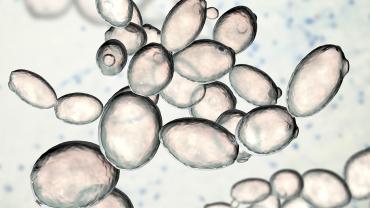
The development of the immune system in childhood aids in the risk reduction of acute infections in childhood, but it may also impact lifelong health. Many diet and lifestyle factors may support the development of a strong immune system in childhood. Certain compounds may add additional aid for training the immune system to provide an effective response.
Beta-glucans are bioactive compounds found in certain bacteria, algae, mushrooms, and yeast, including baker’s yeast. These compounds may help train the immune system, which can help any future immune health responses. Beta-glucans have markers that innate immune cells recognize as microbe-associated molecular patterns. The immune cells are phagocytosed and processed, and they may maintain a memory of the effects. This memory then allows the innate immune system to be primed when facing similar markers to elicit an effective response. This immune support may help promote immune function in children.
Clinical studies have reviewed the potential for beta-glucans from baker’s yeast beta-glucans (BYBGs) to support immune function in children. A randomized controlled trial with 174 participants (children aged 1 to 4 years) found that supplementation with trademarked BYBGs in Wellmune® of 35 mg or 75 mg for 12 weeks led to a reduction in the duration and number of upper respiratory tract infections (URTIs) compared to a placebo. The children taking Wellmune® experienced two-thirds fewer URTI symptoms compared to a placebo. The placebo group had an average URTI duration of 8.9 days compared to 3.5 days in the 75 mg/day group and 2.9 days in the 35 mg/day group. The average number of URTI episodes in the placebo group was 1.5 compared to 0.7 in the 75 mg/day group and 0.5 in the 35 mg/day group. Additionally, 85% of the children in the placebo group reported one or more episodes of infectious illness during the study compared to 47% and 32% of children in the 75 mg/day and 35 mg/day, respectively.
Adding BYBG to follow-up formula may also support children’s immune function.* Another randomized controlled trial of children aged 3 to 4 years were given a follow-up formula with 25 mg of docosahexaenoic acid (DHA), 1.2 g of prebiotics polydextrose (PDX) and galactooligosaccharides (GOS) each, and 8.7 mg of Wellmune® or unfortified cow’s milk beverage as a control for 28 weeks. Those consuming the follow-up formula experienced fewer episodes and a shorter duration of acute respiratory infections, less antibiotic use, and fewer missed days of daycare due to illness compared to a placebo. There were also higher levels of interleukin-10 and white blood cell counts at the end of the study, demonstrating a potential beneficial impact on immune cells.
A randomized controlled trial of 256 healthy children, aged 1 to 4 years, found that consuming a follow-up formula with 25 mg of DHA, 1.2 g of PDX and GOS each, and 8.7 mg of Wellmune® three times daily for up to 28 weeks led to fewer episodes of allergic manifestations in the skin and respiratory tract.
Finding ways to support the development of a strong immune system in children may support overall health throughout life. Certain compounds, such as the beta-glucans found in baker’s yeast, may help to train the immune system with the tools it needs to respond effectively.
By Kendra Whitmire, MS, CNS